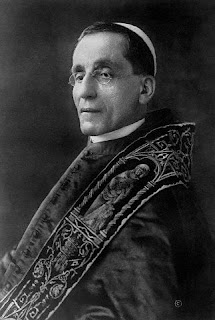Monday, May 9
by Matthew Alderman
A form of this article was published in The Entablature, May 2005, the monthly newsletter of the student body of the School of Architecture at Notre Dame. This is mostly preaching to the choir, but I figure our readership would find this of interest as an example of a simple apologia for the new pope, considering it was originally written for and circulated to a primarily secular audience.
Within twenty-four hours of his election, the official media story on the new pope had coalesced. The standard portrait shows him as a hardliner, maybe just barely starting to go soft. Such language misses the heart of the man, who, like the Church he serves, transcends political labels. He is a father, quiet but strong, whose unexpected personal gentility comes from deeply-held beliefs rather than in spite of them.
I met the Pope back when he was Cardinal Ratzinger. He was available to any pilgrim who wished to see him, a rarity in Rome. Every Thursday morning, he held a Mass open to anyone, and spent at least five minutes afterwards with each visitor. He possesses a common touch. His English is excellent, spoken in a soft, Bavarian accent. He is quiet, shy, and gently charming, and doesn’t even mind posing for a picture or two.
While some compare Benedict unfavorably with his charismatic predecessor, he comes into the papacy beloved by the same youths once drawn to John Paul II. There's even an unofficial Ratzinger Fan Club with website, coffee-mugs and tee-shirts. From what I saw, Benedict finds this faintly amusing.
While his former Vatican job required him to deal with complex theological issues, he still has time to ponder life’s simple questions. His book God and the World, written with journalist Peter Seewald, deals with the basic concerns all Catholics—and all people—face: God, prayer, faith, doubt, despair, joy. And whether God has a sense of humor—“Sometimes he gives you something like a nudge and says, ‘Don’t take yourself so seriously!’ ” said Ratzinger. While holding to the truth of the Church, the breadth and depth of Benedict’'s writings show that his deep-set beliefs have contributed to his imagination rather than hindering it.
Incidentally, Ratzinger was nearly hired by Notre Dame’s Fr. Hesburgh in the 1960s, but back then his English wasn’t good enough.
What does a Ratzinger papacy hold for the future? Pope Benedict XVI will continue the work of John Paul II in all areas. There are already rumors of developments in ecumenism, while Benedict will appear, like John Paul II planned to, at this year's World Youth Day in Cologne. He also brings several interests of his own to the table. He will beautify the Mass, liturgical music and sacred architecture in a manner congruent with tradition and Vatican II--a council where he played a significant role as theologian. Yet, he is a prudent man--all changes will be gradual and carefully considered.
Before you decide your opinion on the new Pope, read what he has written--not just theofficial doctrinal pronouncements, but his numerous, more personal works, like God and the World. You will find in them, and in him, a promising sign for the future.












